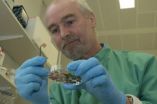(Press-News.org) Drinking three to four cups of coffee per day may help to prevent type 2 diabetes according to research highlighted in a session report published by the Institute for Scientific Information on Coffee (ISIC), a not-for-profit organisation devoted to the study and disclosure of science related to coffee and health.
Recent scientific evidence has consistently linked regular, moderate coffee consumption with a possible reduced risk of developing type 2 diabetes. An update of this research and key findings presented during a session at the 2012 World Congress on Prevention of Diabetes and Its Complications (WCPD) is summarised in the report.
The report outlines the epidemiological evidence linking coffee consumption to diabetes prevention, highlighting research that shows three to four cups of coffee per day is associated with an approximate 25 per cent lower risk of developing type 2 diabetes, compared to consuming none or less than two cups per day1. Another study also found an inverse dose dependent response effect with each additional cup of coffee reducing the relative risk by 7-8 per cent2.
Whilst these epidemiological studies suggest an association between moderate coffee consumption and reduced risk of developing diabetes, they are unable to infer a causal effect. As such, clinical intervention trails are required to study the effect in a controlled setting. One prospective randomized controlled trial3, tested glucose and insulin after an oral glucose tolerance test with 12g decaffeinated coffee, 1g chlorogenic acid, 500 mg trigonelline, or placebo. This study demonstrated that chlorogenic acid, and trigonelline reduced early glucose and insulin responses, and contribute to the putative beneficial effect of coffee.
The report notes that the association between coffee consumption a reduced risk of type 2 diabetes could be seen as counter intuitive, as drinking coffee is often linked to unhealthier habits, such as smoking and low levels of physical activity. Furthermore, studies have illustrated that moderate coffee consumption is not associated with an increased risk of hypertension, stroke or coronary heart disease4 ,5, 6. Research with patients with CVD has also shown that moderate coffee consumption is inversely associated with risk of heart failure, with a J-shaped relationship7.
Finally, the report puts forward some of the key mechanistic theories that underlie the possible relationship between coffee consumption and the reduced risk of diabetes. These included the 'Energy Expenditure Hypothesis', which suggests that the caffeine in coffee stimulates metabolism and increases energy expenditure and the 'Carbohydrate Metabolic Hypothesis', whereby it is thought that coffee components play a key role by influencing the glucose balance within the body. There is also a subset of theories that suggest coffee contains components that may improve insulin sensitivity though mechanisms such as modulating inflammatory pathways, mediating the oxidative stress of cells, hormonal effects or by reducing iron stores.
Dr. Pilar Riobó Serván, Associate Chief of Endocrinology and Nutrition, Jiménez Díaz-Capio Hospital of Madrid and a speaker at the WCPD session concludes the report, commenting: "A dose-dependent inverse association between coffee drinking and total mortality has been demonstrated in general population and it persists among diabetics. Although more research on the effect of coffee in health is yet needed, current information suggests that coffee is not as bad as previously considered!"
### The session report details the key scientific research presented by Dr. Nathan Matusheski , Professor Jaakko Tuomilehto, Dr. Pilar Riobó Serván and Professor Edith Feskens during a session entitled: Good things in life: Can coffee help in diabetes prevention? at the World Congress of Diabetes Prevention and Its Complications, which took place on the 12th November in Madrid, Spain.
For more information or to read the report, please visit www.coffeeandhealth.org.
Notes to editors
About ISIC
The Institute for Scientific Information on Coffee (ISIC) is a not-for-profit organization, established in 1990 and devoted to the study and disclosure of science related to "coffee and health." Since 2003 ISIC also supports a pan-European education programme, working in partnership with national coffee associations in nine countries to convey current scientific knowledge on "coffee and health" to health care professionals.
ISIC's activities are focused on:
the study of scientific matters related to "coffee and health"
the collection and evaluation of studies and scientific information about "coffee and health"
the support of independent scientific research on "coffee and health"
active dissemination of balanced "coffee and health" scientific evidence and knowledge to a broad range of stakeholders.
ISIC respects scientific research ethics in all its activities. ISIC's communications are based on sound science and rely on evidence and scientific studies derived from peer-reviewed scientific journals and other publications.
ISIC members are seven of the major European coffee companies: DE Master Blenders 1753, illycaffè, Kraft Foods, Lavazza, Nestlé, Paulig, and Tchibo.
About coffeeandhealth.org
The website www.coffeeandhealth.org is a science-based resource developed for health care and other professional audiences and provides the latest information and research into coffee, caffeine and health.
Follow us on twitter: @coffeeandhealth
Moderate coffee consumption may reduce risk of diabetes by up to 25 percent
2012-12-04
ELSE PRESS RELEASES FROM THIS DATE:
Fox invasion threatens wave of extinction, UC research finds
2012-12-04
Using DNA detection techniques developed at the University, the team mapped the presence of foxes in Tasmania, predicted their spread and developed a model of their likely distribution as a blueprint for fox eradication, but swift and decisive action is needed.
University of Canberra professor in wildlife genetics and leader of the team, Stephen Sarre, found foxes are widespread in northern and eastern Tasmania and the model developed by his team forecasts they will spread even further with likely devastating consequences for the island's wildlife.
"There's nothing ...
Ray of hope for human Usher syndrome patients
2012-12-04
After years of basic research, scientists at Johannes Gutenberg University Mainz (JGU) are increasingly able to understand the mechanisms underlying the human Usher syndrome and are coming ever closer to finding a successful treatment approach. The scientists in the Usher research group of Professor Dr. Uwe Wolfrum are evaluating two different strategies. These involve either the repair of mutated genes or the deactivation of the genetic defects using agents. Based on results obtained to date, both options seem promising. Usher syndrome is a congenital disorder that causes ...
New study shows how copper restricts the spread of global antibiotic-resistant infections
2012-12-04
New research from the University of Southampton has shown that copper can prevent horizontal transmission of genes, which has contributed to the increasing number of antibiotic-resistant infections worldwide.
Horizontal gene transfer (HGT) in bacteria is largely responsible for the development of antibiotic-resistance, which has led to an increasing number of difficult-to-treat healthcare-associated infections (HCAIs).
The newly-published paper, which appears in the journal mBio, shows that while HGT can take place in the environment, on frequently-touched surfaces, ...
Metabolic biomarkers for preventive molecular medicine
2012-12-04
One of the big challenges of biomedicine is understanding the origin of illnesses in order to improve early detection and significantly increase recovery rates, as well as being able to do what CNIO researchers call preventive molecular medicine, which consists of identifying those individuals who have a greater molecular risk of suffering certain pathologies in order to prevent them. The ageing of the organism, and therefore of the cells and tissues it is made of, represents the greatest risk factor for the majority of developed-world illnesses, including cancer.
A team ...
Carnegie debuts revolutionary biosphere mapping capability at AGU
2012-12-04
San Francisco, CA —Researchers from the Carnegie Institution are rolling out results from the new Airborne Taxonomic Mapping System, or AToMS, for the first time at the American Geophysical Union (AGU) meetings in San Francisco. The groundbreaking technology and its scientific observations are uncovering a previously invisible ecological world. To watch a video about how AToMS is helping researchers look at the world in a whole new way, click here.
AToMS, which launched in June 2011, uniquely combines laser and spectral imaging instrumentation onboard a twin-engine aircraft ...
African savannah -- and its lions -- declining at alarming rates
2012-12-04
DURHAM, NC -- About 75 percent of Africa's savannahs and more than two-thirds of the lion population once estimated to live there have disappeared in the last 50 years, according to a study published this week in the journal Biodiversity and Conservation.
The study, led by Duke University researchers, estimates the number of lions now living on the savannahs to be as low as 32,000, down from nearly 100,000 in 1960. Lion populations in West Africa have experienced the greatest declines.
"The word savannah conjures up visions of vast open plains teeming with wildlife. ...
Driverless vehicles expected to navigate intersection of safety, speed
2012-12-04
How do driverless vehicles navigate through intersections? Faster and safer than if humans were in charge, according to researchers with the Virginia Tech Transportation Institute.
Autonomous vehicles will turn themselves over to an automated intersection controller, which adjusts the trajectory and speed of the vehicles to prevent crashes, said Ismail Zohdy of Cairo, Egypt, a Ph.D. student in civil engineering at Virginia Tech, and Hesham Rakha, director of the Center for Sustainable Mobility at the transportation institute and professor of civil engineering at the university. ...
New method for creating long-lived stem cells used for bone replacement
2012-12-04
New Rochelle, NY, December 4, 2012—Human mesenchymal stem cells (hMSCs) can develop into bone cells and are useful for tissue engineering and regeneration. However, when grown in the laboratory they quickly lose their ability to continue dividing and they die. A method for genetically engineering hMSCs so they become immortal and still retain their ability to become bone cells is described in an article published in BioResearch Open Access, a bimonthly peer-reviewed journal from Mary Ann Liebert, Inc., publishers. The article is available free on the BioResearch Open Access ...
Nanotechnology drug delivery shows promise for treatment of pediatric cancer
2012-12-04
Wilmington, DE – This month, Molecular Pharmaceutics reported promising findings from the Nemours Center for Childhood Cancer Research and the Materials Science and Engineering Department at the University of Delaware, about the potential for nanotechnology to deliver chemotherapeutic agents in a way that attacks cancer cells without harming healthy cells. To date, nanoparticle-based drug delivery approaches have been poorly developed for the treatment of childhood leukemia, which comprises 30% of childhood cancers. In the Nemours study, encapsulated dexamethasone ("dex") ...
Study finds prioritizing rather than canvassing entire plant genome may lead to improved crops
2012-12-04
MANHATTAN, Kan. -- A new study may help scientists produce better climate-resistant corn and other food production plants by putting a spin on the notion that we are what we eat.
Kansas State University geneticists and colleagues found that by applying a genetic-analysis method used to study and prioritize the genes in humans, it improved the likelihood of finding critical genes in food production plants. These genes control quantitate traits in plants, such as how the plants grow and when they flower.
Additionally, this method can be used to study how food production ...


